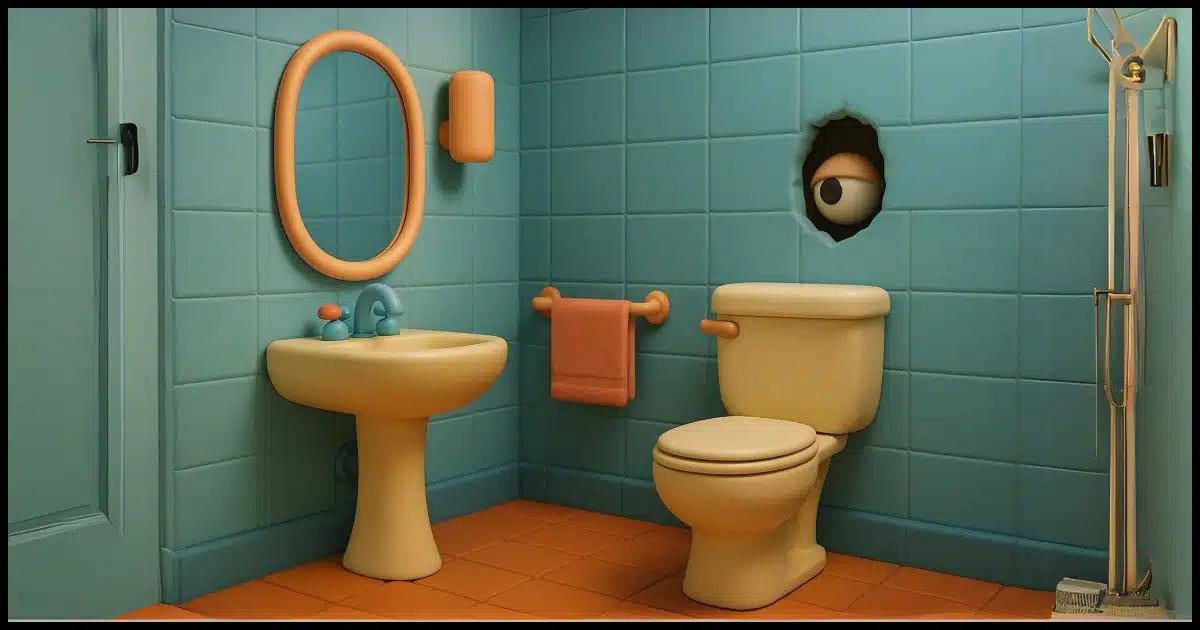Revisiting my silliest metaphor.

That’s an excellent and important question. After Windows 10’s end of support, you’ll get no security updates for Windows itself. But most security software, like Defender, Malwarebytes, and many others, will keep working and being updated for a long time thereafter.
Do they solve the problem?
Solve? No. Reduce the risk? Definitely.

Security updates fix vulnerabilities (holes in your computer’s “walls”) to stop attackers from getting in. Security software acts like guards, catching the threats that try to exploit those holes. After Windows 10 support ends, no more holes will be patched. You’ll depend more on your security software and your own habits to stay protected.
The “PC as a bathroom” metaphor
I think of this as my silliest metaphor ever, but I think it helps get the point across.
Think of your computer as a bathroom. You have some expectation of privacy and security while you use it. You probably even consider privacy and security very important when you’re in there.
A vulnerability is like a hole in the bathroom wall. It could be a small hole that just allows someone to peek inside, or it could be a larger hole allowing someone to reach inside and do something, like flush the toilet when you’re not around. You may have holes in your bathroom that no one knows about yet.
Malware is like those creeps actively trying to use the holes they’ve found. Malware bugs try to peek into your bathroom or worse.
An exploit is when malware (a creep) actually finds a hole (a vulnerability) and does something malicious.
Security updates are the construction workers that come around to your bathroom every so often and plug or patch the holes (vulnerabilities) they know about.
Security software is like the security guard patrolling your home to watch for suspicious creeps (malware) who are up to no good.
Help keep it going by becoming a Patron.
End of support
At a product’s end of support, the construction workers (the security updates) go home, never to return. Any holes left in your bathroom walls will be there as long as you have that bathroom. If a creep can find a hole and get to it, they can do their malicious things.
If you’re not actively patching the holes in your bathroom walls, you’re relying much more heavily on your security guards to keep the creeps out.
Or, in computer terms: if you’re no longer getting security updates to patch the vulnerabilities in your computer’s software, you’re relying much more heavily on your security software to keep the malware out.
You’re also relying on your own behavior more. You don’t allow strangers into your home, for example, because they might be creeps, and you don’t trust the salesperson or overexcited messenger at your door claiming to be something they’re not.
In other words, you don’t download and install software or open attachments you don’t absolutely trust, and you know to keep an eye out for spam and phishing.
You become even more skeptical of anyone you let into your house. Or your bathroom. Or your computer.
More end of support
Some day, your security company is going to say “Sorry, your house is too old, we can’t keep it secure any more”, and stop coming around. Given that your security software has become extra important since security updates stopped, that will be a problem.
You have two choices when that happens.
- Find another company to provide security guards willing to keep an eye on your old house. In other words, get new security software that will still support your Windows 10 computer.
- Move to a more modern house.
It’s important to realize that this is completely separate from the original end of support we talked about above. Using Windows 10 as an example:
- Windows 10’s end of support (no more hole patching) comes in October of 2025.
- Windows Defender end of support for Windows 10 (meaning no more patrolling security guards) is several years later.
- Other security software vendors (other security guard companies) may have different dates before they pull their crew, but again, it’s typically several years after the original Windows end of support.
Pragmatically, many (if not most) folks will have moved (gotten a new computer or installed a new operating system) by that time and already be living in a more modern house with a shiny new bathroom that their security company is more than willing to keep an eye on.
Do this
Yes, your security software will help protect you, but it’s not the same as fixing the vulnerabilities no longer being patched in the operating system. Coupled with a renewed focus on your own good behavior, good security software may be enough to keep you more secure. This could be the basis for using an operating system such as Windows 10 long past its end-of-support date.
Be on the lookout for more strange metaphors by subscribing to Confident Computing! Less frustration and more confidence, solutions, answers, and tips in your inbox every week.



A computer is like a toilet in many ways.

Great report Leo on Windows 10.
One thing I have not seen mentioned is that Microsoft will be
offering up to 3 years back-up for Windows 10 for $30 per year –
accumulative, is this true or hype?
Thanks
Allan
It’s one year only for consumers.
So far, all they’ve offered is one year for $30. If they make enough money from that, they may continue, but that’s 100% speculation.
I downloaded the security for one year from Microsoft for free. If Microsoft can sell security for Windows 10 for $30.00 a year every year to millions of people who don’t want to get rid of their computers that runs on windows 10, they will just keep selling the security for windows 10 forever as long as people want it. The bottom line is this. If the security for Widows 10 continues sell year after year, and make money for Microsoft, it won’t go anywhere.
That’s also what I suspect, but you never know. Microsoft and logical marketing is an oyymoron.
I’ve watched your videos and commented here of that I am sure though I never received a reply.
Hopefully I will this time.
For those unaware Microsoft also offered a year’s extended security update programme for 100 Microsoft Rewards points.
They seem to be either back tracking or have withdrawn the offer as all I have received from them is a ” reminder” email with an ”option” to buy Windows 11 which I do not want…ever.
No ” co pilot” or ” recall” for me thank you very much.
Here in the UK we have a magazine called Computer Active which mentioned a Company that’s offering 5 years extra protection for a reasonable fee.
Do you know of this company or one like it?
Please help.
I accidentally recycled the magazine issue containing the details and although I emailed them they never replied.
They’re not “back tracking”. The offer for ESU hasn’t rolled out to everyone yet. Be patient. It will be available to all elligible users before Windows 10 and of support date. (The free offer may not be available to everyone, but should be to most, again when it rolls out, which it has not yet done for everyone.